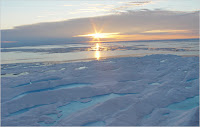
At the first step, we read the news about California Wildfires and used the southern California’s map together to help us know more about the locations where broke out the disasters. In the news we knew the wildfires were really devastating and a lot of people as well as their animals were ordered to evacuate to other shelters. But some of them who lived near the coast could go home now and they were really worried about whether their houses and ranches were still here or not. Because of the power shortage which was associated with the wildfires in California, the residents should conserve the power. The factors which fueled the wildfires were dry weather, heat and wind. Many people such as volunteers, federal government and the Red Cross went there to help and give supplies to the evacuees.
After that, we watched many videos and saw some pictures about the news. The conditions there were seriously and horrible. We just couldn't believe the power that the wildfires had. In the videos we knew there had been wildfires like this time before. Because of that the government renewed the equipments, added more firefighters and trained them seriously to have well-prepared. At this time less people died and injured. We also heard some thoughts in the evacuees’ mind. They told that they were really worried about their houses, families and friends whether everything was OK or not. After hearing that, we were so sad and sympathetic. We couldn't do anything but prayed for them.
At last we checked the interaction part and learned some methods to put out the wildfires such as air tankers, bucket drops, fire lines and backfires. After reading the news and trying the multimedia, we really learned a lot from them and knew how terrible the wildfires were.Record:http://www.supload.com/sound_confirm.php?get=1178191601.wma
